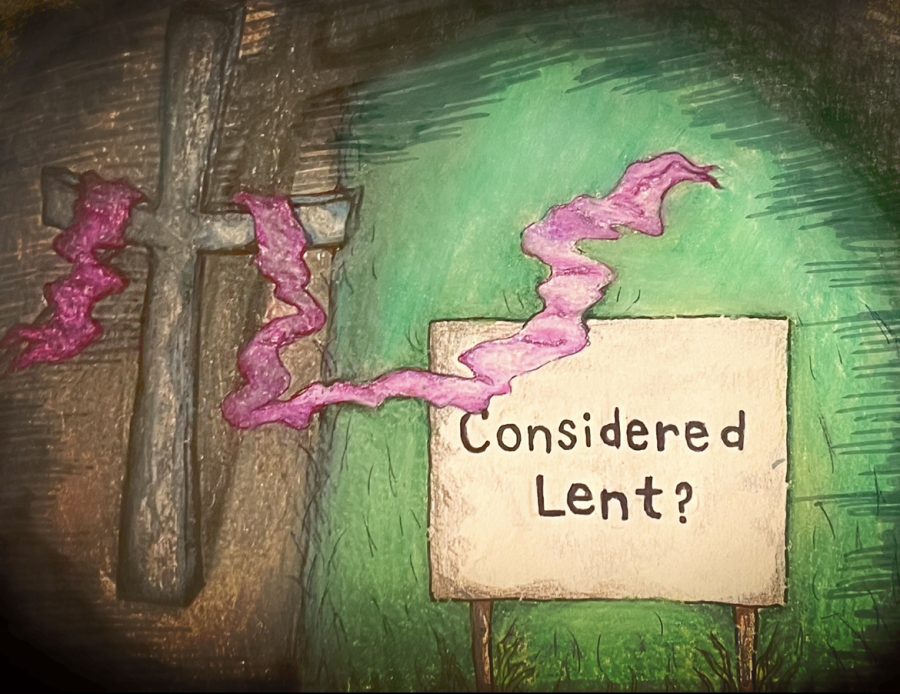Lent and the art of letting go
March 26, 2023
Editor’s note: A previous version of this story stated that all 6,386 students served by UT’s Counseling and Mental Health Center were in distress, which is incorrect. The Texan regrets this error.
Content Warning: This column contains mention of mental health concerns.
Two weeks ago, many students walked about UT’s campus with ashen crosses on their foreheads. This practice corresponds with Ash Wednesday, the holiday on the Western Christian calendar which marks the beginning of the 40-day season of fasting and repentance before Easter known as Lent. This practice of abstinence and self-reflection offers a model which can benefit college students’ mental health today.
According to the American College Health Association, over three-quarters of college students last year reported experiencing moderate to serious psychological distress, with a majority being diagnosed with anxiety or depression. UT’s Counseling and Mental Health Center served 6,386 students in the 2021-2022 school year, which is more than 15% of UT’s student population.
“Anxiety, stress, depression, academic concerns, social isolation and loneliness are the top reasons why students seek care at the CMHC”, said Laura Kinch, the assistant director of communications and marketing for Healthyhorns.
Additionally, approximately 1 in 5 college students meet the criteria for alcohol use disorder and 44% binge drink on a normal basis. Nicotine use among college-aged students has tripled since 2017, with 22% of students claiming to have used the substance in the past 30 days.
The problem is apparent. College students are steeped in a culture of seeking out external remedies for the pressures of their lives. This often results in substance abuse, disordered eating habits or, at best, seeking out counseling and medication.
At its core, the practice of Lent offers a different kind of healing. It’s the kind of healing that comes about by learning to let go of things. For many students, this means giving up certain foods, social media or weekly outings for the 40 day season.
“People are sometimes unhappy because they don’t have their faculties under control, and it brings them every which way in their emotional life,” said Joshua Porter, a member at the University Catholic Center and petroleum engineering junior. “So the thing to bring that into subjection is to fast, to do penitential practices, to do self denial. Then you get your (emotions) under the power of your intellect.”
Of course, Lent isn’t just about subtracting bad habits of excess; it’s also about consciously adding good into our lives. For Lauren E. Koops, a journalism junior and University Episcopalian Center member, her Lenten discipline involves implementing 30 minutes of writing and prayer each day.
“I find that all of these issues I was dealing with on campus are more manageable. They don’t go away,” Koops said. “They’re just so much more manageable because my priorities are realigned.”
Intentionally choosing to abstain from something we typically rely on allows us to gain a new appreciation for it in the future. Apart from the long term mental health benefits of intermittent fasting, the practice of Lent also offers an opportunity for college students to reflect on which of our wants have been twisted into needs.
“At the end of the day, we all have to make sacrifices,” said Basil Anaipakos, an accounting sophomore and attendee of Transfiguration Greek Orthodox Church. “And I think that’s something you just have to consider when Lent comes around. It’s not something you can just sweep under the rug.”
Perhaps this urgency and community-wide effort towards betterment is what makes it so effective as a tool for breaking free from vice. Lent teaches us to perfect ourselves to make the world a better place, because true contentment comes from no external thing.
Martin is a Advertising and Radio-Television-Film junior from Rockwall, TX.
















